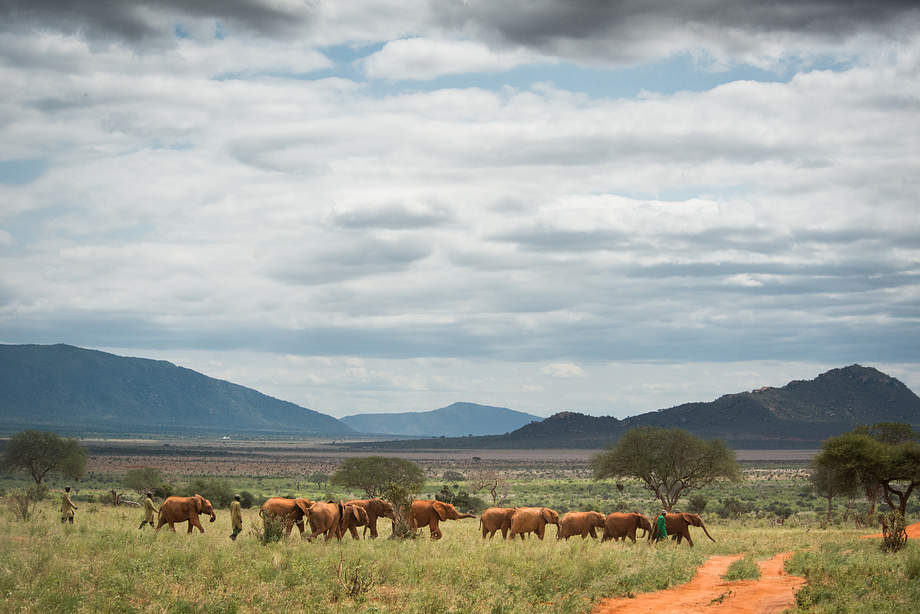Voi was blessed with better rains that other parts of the Park, including Ithumba. The vegetation around Msinga Hill was lush and green in June which is why it is a good time to move some of our Nursery babies who are ready to graduate.
Emoli, Tagwa and Sagala were the most recent arrivals to the Voi Reintegration Unit from our Nairobi Nursery on the 4th of June. Mbegu’s band of six including Godoma, Ngilai, Ndotto, Murit and Lasayen, who they would have remembered from the Nursery, were brought closer to the compound to welcome them off the translocation lorry, but the Voi orphans almost needed no direction as they could sense that something exciting was afoot and browsed not far away on the Msinga Hill. After greeting Mbegu’s herd amid much excitement and rumbling, Kenia’s older herd were brought over to greet the new babies. Arruba and Embu were particularly excited to meet them and jumped into the stockade mud bath to show off their games.
The new arrivals didn’t seem to disturb the dynamic in the Voi herd very much, with Kenia’s older group members (Kihari, Panda, Lentili, Ishaq-B, Tundani, Nelion, Ndoria, Mashariki, Suswa, Rorogoi, Ndii, Lentili and Arruba) still doting on the youngsters Tahri and Araba, and Mbegu’s herd still happily grouped together as well. It did nothing to upset the dynamic, but perhaps brought all the orphans closer together in a way, as we witnessed many more games and interactions between Kenia and Mbegu’s herd. Over the coming days Sagala chose to stick mostly to her friends Tagwa and Emoli. Lasayen has become rather attached to Emoli and is often witnessed patting him with his trunk and making sure he is okay. Overall Emoli has settled in very well, engaging with wild elephants and playing with wild friends his own age, almost to the frustration of Tagwa who is taking a little longer, and sometimes she is seen taking this out on Emoli and head-butting him, which is when the Keepers intervene. It is lovely to see the young new arrivals like Emoli and Sagala being so comfortable in their new home, but not altogether surprising as they were both rescued from Tsavo East National Park.
Kenia’s older herd might be less milk dependent now, but they are still dependent on the Keepers and the herd as a whole. The interactions with the wild elephants around the stockade and mud bath this month will help bring them that much closer to feeling a certain level of independence however, and slowly but surely we might see members of this older herd start to feel emboldened enough to drift away, just like Mbirikani did last year. Mbirikani’s sporadic presence this month is another catalyst to help spur some of the other older orphans on to explore their independence too. One day Kihari and Ishaq-B saw Mbirikani browsing atop Msinga Hill and decided to join her to browse. They did not return to the stockades that night, choosing to spend the entire night on the hill with their old friend. Nelion and Ndoria are also exploring their independence. Both are choosing to sometimes join up with wild herds and browse with them for a few hours, returning to the Voi herd later on in the day to return to the stockades for the night with them. Even Panda and Lentili followed Nelion who went to browse with a wild herd one day, but all these babies chose to return to the safety of the stockades with their friends at night.
The rains in this area of Tsavo have brought the wild herds in to feast on the vegetation around, and take advantage of the water pools which are kept topped up by the SWT water bowser, including the one at the mud bath which the orphans visit every day for their noon milk bottle, for those that are still milk dependent, and the chance to wallow should they desire. As usual after the rains, June and July are fairly cold months, and the orphans often chose to forego the mud bath in favour of returning to the bush to browse. Embu, Arruba and Bada seem to love the water the most at the moment, and sometimes plunge in just when we think none of the orphans will feel like swimming, and the others shy away from them in order not to get wet by the cold water! The baobab tree water-hole however is where the most amazing wild elephant interactions took place as well this month, as the wild herds drawn in by the greenery in the area came to drink from the same water troughs making for spectacular interactions. This included the presence of some very impressive wild bulls, who the Keepers and orphan babies all stopped to admire. The young babies lifted their trunks to smell these impressive big boys and stood gazing in awe at them, perhaps wondering when they too will grow to such a size.
Towards the end of the month we were visited by Tawi, the male stockade-raised eland who went wild with his friend the buffalo Ol-tukai. He arrived without his buffalo friend and stuck around for a few days, checking in on the Keepers. On the same day he arrived, the SWT/KWS Tsavo Mobile Veterinary Unit team on a normal patrol spotted Ol-tukai among some wild elephants, drinking from the Ngutuni water hole.
